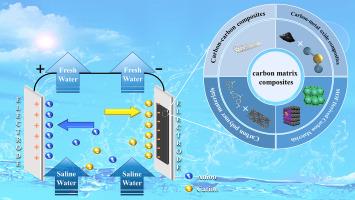Research progress on the application of carbon-based composites in capacitive deionization technology
IF 8.3
1区 工程技术
Q1 ENGINEERING, CHEMICAL
引用次数: 0
Abstract
Capacitive deionization (CDI) technology is favored by researchers for its environmental friendliness and higher selectivity. Among a number of electrode materials, carbon-based nanomaterials are considered suitable materials for CDI electrodes due to their excellent chemical stability, better economic benefits, etc. However, the conductivity and hydrophilicity of pure carbon electrode materials are generally poor. Therefore, researchers have focused on carbon-based composites. This paper provides a comprehensive review of carbon‑carbon composite materials and various carbon-based materials composited with metal oxides, metal-organic frameworks (MOFs), and polymers. In addition, the article summarizes the ion storage mechanism of CDI. Finally, the article provides an outlook on the future applications of CDI. It could provide good guidance for designing carbon-based materials for capacitive deionization.

碳基复合材料在电容式去离子技术中的应用研究进展
电容式去离子(CDI)技术因其环保性和更高的选择性而受到研究人员的青睐。在众多电极材料中,碳基纳米材料因其优异的化学稳定性、较好的经济效益等被认为是 CDI 电极的合适材料。然而,纯碳电极材料的导电性和亲水性普遍较差。因此,研究人员将目光投向了碳基复合材料。本文全面综述了碳-碳复合材料以及与金属氧化物、金属有机框架(MOF)和聚合物复合的各种碳基材料。此外,文章还总结了 CDI 的离子存储机制。最后,文章对 CDI 的未来应用进行了展望。它为设计用于电容式去离子的碳基材料提供了很好的指导。
本文章由计算机程序翻译,如有差异,请以英文原文为准。
求助全文
约1分钟内获得全文
求助全文
来源期刊

Desalination
工程技术-工程:化工
CiteScore
14.60
自引率
20.20%
发文量
619
审稿时长
41 days
期刊介绍:
Desalination is a scholarly journal that focuses on the field of desalination materials, processes, and associated technologies. It encompasses a wide range of disciplines and aims to publish exceptional papers in this area.
The journal invites submissions that explicitly revolve around water desalting and its applications to various sources such as seawater, groundwater, and wastewater. It particularly encourages research on diverse desalination methods including thermal, membrane, sorption, and hybrid processes.
By providing a platform for innovative studies, Desalination aims to advance the understanding and development of desalination technologies, promoting sustainable solutions for water scarcity challenges.
 求助内容:
求助内容: 应助结果提醒方式:
应助结果提醒方式:


